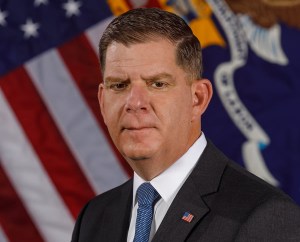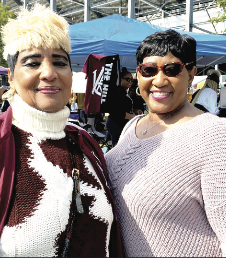
White House Secretary of Labor Martin J. Walsh (Courtesy of the U.S. Department of Labor)
By Alexis Taylor
Special to the AFRO
Legislators will take a vote on the Bipartisan Infrastructure Deal on Sept. 27th now that it has passed both houses of Congress. Billions of dollars will be poured into the goals of connecting every household to broadband, fixing lead pipes and rolling out electric school buses. The bill addresses climate change, pollution of Black communities and sets aside billions to improve transportation for both workers and riders.
This month, White House Secretary of Labor Martin J. Walsh briefly spoke with the AFRO about the bill and what it will mean for Black workers and business owners.
AFRO: What will communities of color gain from the passing of this legislation?
Secretary Martin Walsh: We have to be real intentional about making sure that investments go to communities that have been left out in the past and the Black community has been one of them. When you think about the Bipartisan Infrastructure Bill you’re thinking about a physical investment in our country-it builds bridges and broadband access.
In broadband, when the pandemic hit, the African-American community and communities of color were left behind. They didn’t have good connectivity to the internet. This will strengthen that.
Many of the communities of color live in areas where they are drinking out of pipes that are lead lined- that’s another issue.
In public transit- the ability to be able to expand public transit in communities of color so that there is better connectivity to the jobs in the communities that people live in.
AFRO: In the case of replacing lead pipes, it’s a cost of $5,000 – but then that’s a savings of $22,000 in health costs that come about as people are drinking that water. Can you talk about how doing this work on the front end will benefit all Americans on the back end?
MW: The whole $1.3 trillion is an investment on the front end and allows the cities and towns of American to be able to have clean drinking water; better broadband access; electric charging stations; better commuter rails and service; better roads and bridges and the ability to connect and to create opportunities for industry in their cities.
This is an investment unlike anything we’ve ever seen in the United States. There is a lot of great investment on the backend. For example, this 1.3 trillion dollar package will create almost two million new jobs in construction related industries. It has the potential to create two million new jobs a year afterwards with the upgrades that we need to do in this country.
AFRO: How will this impact women-owned and minority businesses?
MW: As this money goes out to the street, we still have to get these contracts out, we will have to make sure there are some requirements there to make sure that the workforce and the contractors working these projects reflect the communities.
We’ve had some major investments in our country in the last hundred years but oftentimes communities of color, in particular the African-American community, both as individual workers and as businesses, get left behind. President Biden has been very clear that he does not want this to happen this time. He will not accept it as well as Vice President Harris.
The political atmosphere around these investments is completely different which is great to hear and see.
Help us Continue to tell OUR Story and join the AFRO family as a member – subscribers are now members! Join here!
The post AFRO Exclusive: Secretary Walsh talks new Infrastructure Bill with the AFRO appeared first on AFRO American Newspapers .










